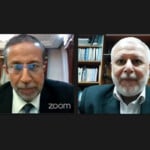On 22/2/2022, al-Zaytouna Centre held a panel discussion entitled “The Possible Scenarios of the Internal Palestinian Situation in Light of the PLO Central Council Meeting and the Options to Deal with It.” Participants included researchers and experts specializing in Palestinian affairs from Palestine, Jordan, Lebanon, Qatar, Turkey and Malaysia.
Prof. Dr. Mohsen Mohammad Saleh opened the discussion stating that since the Palestinian elections and the reconciliation process were disrupted on 29/4/2021, there are indications that the leadership of the Palestinian Authority (PA) and the Palestine Liberation Organization (PLO) is insisting on its behavior, in order to maintain its dominance in the Palestinian arena. An example of that the PA’s security tightening, the local elections, the convening of the Palestinian Central Council (PCC), and including the PLO to the State of Palestine.
The writer, researcher and editor-in-chief of Assabeel newspaper, ‘Atef al-Joulani presented five scenarios for the future of the internal Palestinian situation after the PCC crisis. First, the stalemate and the continuation of the status quo; Second, the PA opponents would form a new national reference; Third, keeping the PLO, withdrawing recognition of its current leadership and holding new elections of its leadership frameworks and institutions; Fourth, achieving reconciliation, attaining national consensus and rebuilding the PLO; Fifth, forming a national transitional alignment, which would cooperate to put pressure on the current PLO leadership to make serious, real and transparent reform in a way it would reflect the will of the Palestinian people at home and abroad. The participants also put forward other scenarios, such as the deterioration of the Palestinian situation or the eruption of an uprising or Intifadah, and they suggested ways to support and expand it.
In light of the current conditions of the Palestinian, Arab, regional and international parties, it was concluded that the chances of forming a national transitional alignment were the highest.
Participants considered implementable Palestinian reconciliation is a must. However, it must not be dependent on the mood of the Palestinian leadership, which has proved not to be serious about reconciliation. They also considered that it is important to interact with the concerns of the Palestinian people and prioritize resistance, for the latter is the basis of political change.
Participants agreed that the required step is to justify the establishment of national alignment, and define its vision, objectives, parameters, policies and jurisdiction, in addition to putting a realistic plan.
Al-Zaytouna Centre for Studies and Consultations, 24/2/2022





Leave A Comment